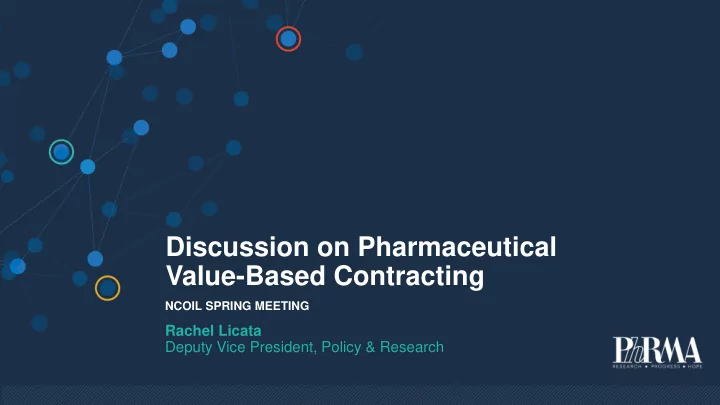

Discussion on Pharmaceutical Value-Based Contracting NCOIL SPRING MEETING Rachel Licata Deputy Vice President, Policy & Research
Taxonomy of Value-Based Contracts Value-Based Contracts Performance-Based Differential Pricing Outcomes-Based Indication-Based Conditional Treatment Regimen-Based Continuation Expenditure Cap 2
Potential Benefits of Expanded Value-Based Contracts Life Years Gained Improved Access and Affordability Improved Quality of Life Improved Improved VALUE-BASED Adherence Outcomes and CONTRACTS and Use of Avoided Medicines Complications Increased Productivity More Support for Appropriate Use of Medicines Reduced Medical Costs ( e.g., avoided hospitalizations) Potential for Additional Discounts or Rebates Reduced Medicine Costs 3
Benefits and Opportunities of Value-Based Contracts Silver-level exchange plans Number of value-based with VBAs plans had 28% contracts continues to rise lower co-pays 74% of payers with outcomes- based contracts reported cost If VBAs reduce costs of savings diabetes 5%, $12 Billion in potential savings annually 4
Most payers have seen reductions in either medical or pharmacy costs through participation in VBCs VBC success in reducing costs for organization Areas of cost reduction from use of VBCs (Percentage respondents) (Percentage respondents) Reduced medical costs 26% only No No 68% Ye Yes 32% Reduced drug costs only 32% Reduced medical and drug 42% costs n=28 Q2b: Have value-based contracts for pharmaceuticals been successful at reducing costs for your organization? Q2c: Where have the reduced costs from value-based contracts for pharmaceuticals been realized within your organization? Source: Health Strategies Group, Legal/Regulatory Barriers to Value-Based Contracting, Final Report January 4, 2019 5
New Developments in Medicaid at the State Level • Value-based supplemental rebate agreements / state plan amendments • Three states (OK, MI, CO) received CMS approval of state plan amendments • WA waiting for approval • Subscription (“Netflix”) models for Hepatitis C cures • LA seeking manufacturers to provide unlimited access to curative Hep C therapies 6
Oklahoma Value-Based Supplemental Rebate SPA • CMS approved an Oklahoma SPA in June 2018 that would allow the state to implement value-based purchasing of drugs through additional supplemental rebates on a voluntary basis. • Four public contracts in place 17
Louisiana RFI Hep C Subscription Payment Model • Louisiana issued an RFI in August on the creation of a subscription-based payment model for Hepatitis C medication; solicitation for offers in January 2019 • Under this payment model, the state would pay a drug manufacturer or manufacturers for unlimited access to the treatment for the individuals in Louisiana who are enrolled in Medicaid or in Louisiana’s correctional system. • Uses supplemental rebate agreements • The payment to the manufacturer would be equal to or less than what the state is currently spending to provide the antiviral medication to these populations. 15
Additional Reform is Needed for Other Markets FDA Rules for • Achieved long-sought flexibility to communicate information about unapproved Manufacturer products or unapproved uses of approved products Communications Need for clear • The Office of the Inspector General released a request for information on “ways in Anti-Kickback which it might modify or add new safe harbors to the anti-kickback statute … in order to foster arrangements that would promote care coordination and advance the Statute delivery of value-based care…” Protection • Rule pending at OMB may provide an opportunity for regulatory changes to create an Clarifying exception to Best Price Medicaid Best • Rule is titled “ Establishing Minimum Standards in Medicaid State Drug Utilization Price Review (DUR) and Supporting Value Based Payments (VBP) for Drugs Covered in Medicaid ” 9
Recommend
More recommend